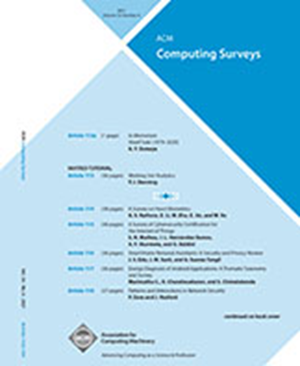A Systematic Literature Review on Bias Evaluation and Mitigation in Automatic Speech Recognition Models for Low-Resource African Languages
IF 28
1区 计算机科学
Q1 COMPUTER SCIENCE, THEORY & METHODS
引用次数: 0
Abstract
With recent advancements in speech recognition, it is crucial to ensure that automatic speech recognition (ASR) systems do not exhibit systematic biases, such as those related to gender, age, accent, and dialect. Although research has extensively examined systematic biases such as those related to gender, age, accent, and dialect, for high-resource languages, research on low-resource African languages remains limited. This systematic literature review synthesizes evidence on bias evaluation and mitigation in ASR models for African languages, adhering to the PRISMA reporting guidelines. Our analysis reveals that most biases stem from data imbalances and limited linguistic diversity in training datasets, resulting in disproportionately high error rates for underrepresented speaker groups. Mitigation strategies in African contexts have primarily focused on data-centric methods, including dataset expansion, augmentation, and transfer learning. In contrast, more advanced approaches, including fairness-aware modeling, bias-aware loss functions, adversarial debiasing, and speaker-adaptive techniques, are rarely applied. Gender, accent, and dialect biases dominate the few African studies available, while age and racial biases are almost absent. The limited number of African languages covered highlights the urgent need for more representative and inclusive research. Addressing these gaps will support the development of fairer and more robust ASR technologies across the continent.非洲低资源语言语音自动识别模型偏差评估与缓解的系统文献综述
随着语音识别的最新进展,确保自动语音识别(ASR)系统不会表现出系统性偏见,例如与性别、年龄、口音和方言相关的偏见,这一点至关重要。尽管研究已经广泛地检查了与性别、年龄、口音和方言有关的系统性偏见,但对于资源丰富的语言,对资源匮乏的非洲语言的研究仍然有限。本系统文献综述根据PRISMA报告准则,综合了非洲语言ASR模型中偏见评估和缓解的证据。我们的分析表明,大多数偏差源于数据不平衡和训练数据集中有限的语言多样性,导致代表性不足的说话者群体的错误率过高。非洲环境下的缓解战略主要侧重于以数据为中心的方法,包括数据集扩展、增强和迁移学习。相比之下,更先进的方法,包括公平感知建模、偏见感知损失函数、对抗性去偏见和说话者自适应技术,很少被应用。性别、口音和方言偏见在为数不多的非洲研究中占主导地位,而年龄和种族偏见几乎不存在。所涵盖的非洲语言数量有限,这突出表明迫切需要进行更具代表性和包容性的研究。解决这些差距将有助于在整个非洲大陆开发更公平和更强大的ASR技术。
本文章由计算机程序翻译,如有差异,请以英文原文为准。
求助全文
约1分钟内获得全文
求助全文
来源期刊

ACM Computing Surveys
工程技术-计算机:理论方法
CiteScore
33.20
自引率
0.60%
发文量
372
审稿时长
12 months
期刊介绍:
ACM Computing Surveys is an academic journal that focuses on publishing surveys and tutorials on various areas of computing research and practice. The journal aims to provide comprehensive and easily understandable articles that guide readers through the literature and help them understand topics outside their specialties. In terms of impact, CSUR has a high reputation with a 2022 Impact Factor of 16.6. It is ranked 3rd out of 111 journals in the field of Computer Science Theory & Methods.
ACM Computing Surveys is indexed and abstracted in various services, including AI2 Semantic Scholar, Baidu, Clarivate/ISI: JCR, CNKI, DeepDyve, DTU, EBSCO: EDS/HOST, and IET Inspec, among others.
 求助内容:
求助内容: 应助结果提醒方式:
应助结果提醒方式:


